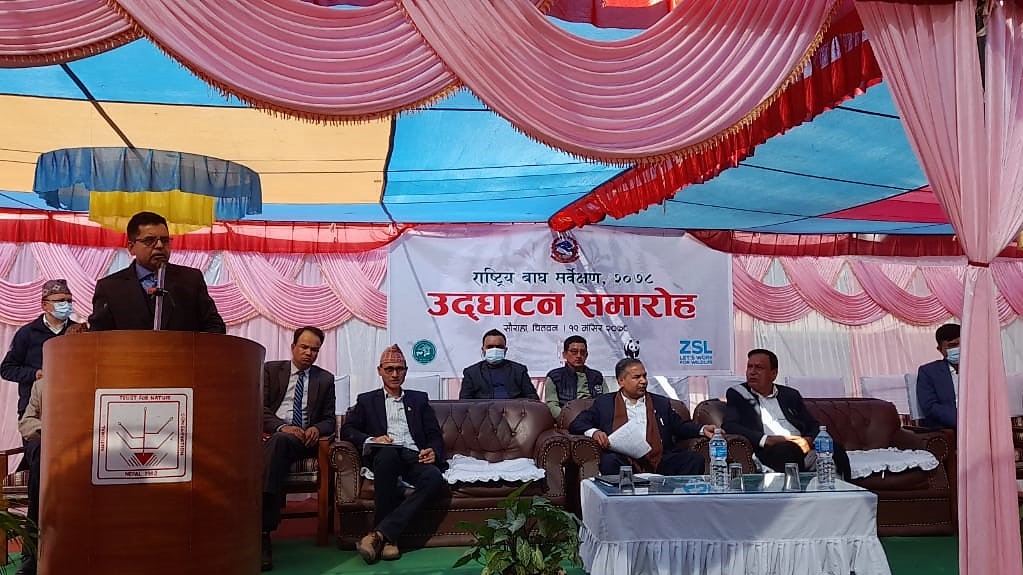Fourth National Tiger Survey Kicks Off in Nepal
Posted on December, 05 2021
Kathmandu, Nepal – The National Tiger Survey 2022 is set to begin today through a launch program in Chitwan National Park. The survey begins with the Chitwan-Parsa complex, covering all tiger habitats of Nepal including national parks, buffer zones and national forests within the vicinity.The National Tiger Survey is governed by the Central Advisory Committee that comprises of heads of organizations from Department of National Parks and Wildlife Conservation, Department of Forests and Soil Conservation, Directorate of National Parks and Reserve-Nepali Army, National Trust for Nature Conservation, WWF Nepal, and ZSL Nepal. Likewise, a technical committee has also been formed under the leadership of ecologists from the Department of National Parks and Wildlife Conservation and other partner organizations, alongside an implementation team led by representatives from respective national parks, and including representatives from the Division Forest Offices, Nepali Army, and conservation partners.

Guided by Tiger and Prey Base Monitoring Protocol, the Survey will follow a methodology that includes Camera Trapping and Habitat Occupancy. Meanwhile, Nepal’s tiger bearing habitats have been divided into three complexes—Chitwan-Parsa, Banke-Bardia, and Shuklaphanta-Laljhadi. An estimated 3938 units of camera traps will be used, across 1,969 grids that traverse these complexes.
Nepal’s last tiger survey in 2018 estimated 235 wild tigers in the country, a near doubling of the baseline of 121 tigers in 2009. The findings from this survey will undoubtedly be crucial, not only in understanding and improving conservation efforts for the species, but also in in terms of tracking Nepal’s progress in achieving its commitment to double its tiger populations by 2022, set at the St. Petersburg Tiger Summit in 2010.

“Nepal has achieved exceptional results in tiger conservation despite a multitude of challenging situations. The numbers are testimony to this. We are confident that Nepal will achieve its TX2 targets this coming year and present it in the upcoming global tiger summit” stated Dr. Ghana S. Gurung, Country Representative, WWF Nepal.
The National Tiger Survey 2022 is led by the Government of Nepal with an estimated budget of NPR 37 million. WWF Nepal, ZSL Nepal and the National Trust for Nature Conservations have provided both technical and financial support,. WWF-UK, WWF Canada, WWF Finland, and Tigers Alive Initiative provided financial support for the survey.
###
About Nepal’s national tiger survey
Nepal’s last National Tiger Survey was conducted between November 2017 and April 2018 in the Terai Arc Landscape (TAL), a transboundary landscape shared with northeastern India. The survey covered five protected areas together with corridors and adjoining forests, with an estimated 18 tigers in Parsa National Park, 93 in Chitwan National Park, 87 in Bardia National Park, 21 in Banke National Park and 16 in Shuklaphanta National Park.
About Tx2
In 2010, the governments of the world’s 13 tiger range countries committed to TX2 at the St Petersburg ‘Tiger Summit’ – the global goal to double the number of wild tigers by 2022, the next Chinese Year of the Tiger. WWF is a key driver of the TX2 goal, working together with governments, businesses, development partners, local communities, and many others to ensure tiger conservation is given the priority and investment it requires.
About WWF
WWF is the world’s leading conservation organization, working in 100 countries for nearly half a century. With the support of almost 5 million members worldwide, WWF is dedicated to delivering science-based solutions to preserve the diversity and abundance of life on Earth, halt the degradation of the environment and combat climate change. WWF has been active in Nepal since the 1960s and remains committed to the vital work being done in the region to save its unique and irreplaceable biodiversity.
Learn more at www.wwfnepal.org
For more information, contact:
Shayasta Tuladhar
Head – Communications and Education
Email: shayasta.tuladhar@wwfnepal.org



